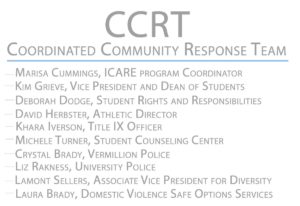
Updated: Sexual assault education grant approved, progress yet to be seen by students
Though USD received a $300,000 grant in October of 2016 to educate students on sexual assault, progress with training and programming has yet to be seen by students.
Marisa Cummings, ICARE program coordinator, was hired last February to oversee the grant’s day-to-day operations. She submitted the strategic plan for ICARE (Inclusion, Compassion, Advocacy, Respect and Engagement) on Sept. 7. The strategic plan was approved by the Department of Justice’s Office on Violence Against Women on Oct. 20.
“I can’t implement a plan that’s not approved by the grant-awarding agency,” Cummings said. “That’s not how grants work. It’s kind of like sitting on my hands.”
The grant lasts three years. Cummings said year one is devoted to planning, year two deals with implementation and year three focuses on sustainability. Year two technically wouldn’t start until the strategic plan was approved.
Programming will kick off with a marketing event on Jan. 22. in the Muenster University Center. Educational training for students will begin in the fall of 2018.
Cummings said the grant has four main components: conduct, law enforcement, prevention and advocacy.
Bystander intervention
ICARE will focus more on bystander intervention and consent than the current online Title IX training students receive per South Dakota Board of Regents policy. With ICARE, students will be training other students about bystander intervention, said Kim Grieve, vice president of student services and dean of students.
“The bystander training will be training students to be trainers to train other students, which I think is a really powerful thing to go towards,” Grieve said. “You want to give as many ways for students to be able to get the information. What will be really different is there will be a lot more training that will happen all year long for students, faculty, staff and community.”
Cummings said a system where students train other students is a best practice in Title IX training.
“Students naturally respond to their peers more than they do an administrator, so that’s why we chose that method,” Cummings said.
Grieve said USD was lucky to receive the grant.
“It’s so important for people to have this information and to understand the effects of sexual assault on individuals, on communities and how to prevent it and to make sure that people have resources in the event they are sexually assaulted and that they feel comfortable to report,” Grieve said. “It will hopefully reduce sexual assault on campus.”
Cummings said she’s hoping for more student involvement with the grant. So far, she’s partnered with PAVE (promoting awareness and victim empowerment), a new student group led by sophomore secondary education major Alyssa Fothergill.
“(Fothergill) just came to our last programming meeting a couple weeks ago,” she said. “We’ll collaborate with any student groups who want to collaborate.”
A team approach

ICARE enlists USD faculty and students, local hospital administrators, the Vermillion Police Department and the Domestic Violence Safe Options Services to form a Coordinated Community Response Team (CCRT).
Bridget Diamond-Welch, assistant professor of criminal justice and professional victimologist, is a member of the CCRT. She said its focus is reducing sexual assault at USD.
“ICARE is victim-centered, trauma-informed policies and practices across USD to try to reduce sexual assault on campus,” Diamond-Welch said. “You get all the people who are involved around the same table and talk about these issues.”
Diamond-Welch said as of now, different organizations have different involvement with victims, which can create conflict. In the event of a sexual assault, she said DVSOS advocates for the rights of victims, the state attorney wants justice, the hospital takes care of physical health and police are trying to pursue evidence.
“All of these people are good people, however what happens is when you start viewing it from your particular framework, you’re only seeing part of the story,” she said.
Cummings said ICARE will make sexual assault training a priority at USD.
“We’re looking at our victim advocacy and how we can make sure to provide the necessary services to victims with a victim-centered approach and a culturally competent manner,” she said.
The Volante has requested a copy of the strategic plan upon approval.


